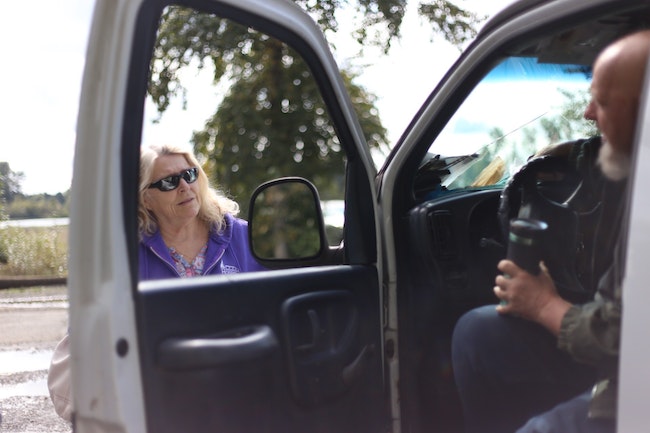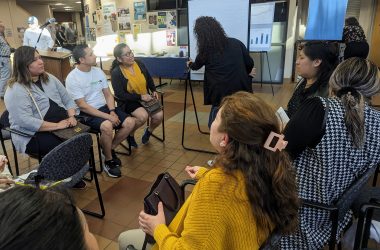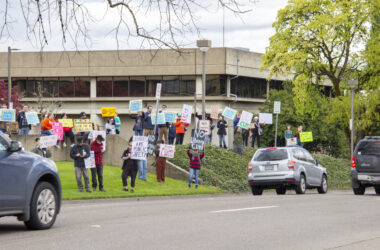 Lorrie Walker, a volunteer with The ARCHES Project, talks with Doug Pendleton at the van he lives in at Cascades Gateway Park. (Troy Brynelson/Salem Reporter)
Lorrie Walker, a volunteer with The ARCHES Project, talks with Doug Pendleton at the van he lives in at Cascades Gateway Park. (Troy Brynelson/Salem Reporter)
After declaring a housing emergency last week, Salem city officials now are opening the way for those living in their vehicles to legally camp on private property – with conditions.
The pilot program allows nonprofit, public or commercial entities provide for car camping at locations not around residences. The city has slotted eight locations, with a limit of six vehicles per location that can stay from 9 p.m. to 7 a.m. Camping is limited to vehicles, like RVs and vans, not tents or other improvised camps.
The registration form is online and requires property owners to supervise the camp outs and provide garbage and toilet facilities at their own cost. The form asks if the location is within city limits, if it’s near a residence and if the person registering the location is the owner of the property.
“Anybody that has a property that qualifies can certainly apply for it,” said Brady Rogers, Salem’s code enforcement officer.
He plans to inspect the properties before they’re approved.
Rogers said the city’s code enforcement staff cites around 75 RVs that park for more than five days on city streets and move to avoid being towed. He estimates the number of homeless campers in smaller vehicles is much lower.
City Councilor Chris Hoy directed city staff to explore car camping in December.
Salem staff considered a car camping program in Eugene, where businesses, religious institutions and public entities can open their lots to up to six vehicles. A vehicle is defined as a “car, tent, camper, trailer or Conestoga hut,” which are micro-shelters. Eugene also allows single-family homes, with some restrictions, to offer their backyards or driveways.
Hoy said he’s “looking forward to seeing how we can positively impact our homeless situation” by adding car camping.
He was volunteering at a warming shelter last year when he met a woman living in her car who needed to use the bathroom and facilities.
“It became clear to me we need to be doing this in a coordinated, organized way,” Hoy said.
The program is scheduled to end March 31, but Hoy said he’d like to see it extended.
“There’s no reason not to,” he said. “I don’t see a downside to it at all.”
The city council last week pulled back from a plan for a temporary homeless shelter in Pringle Community Hall and instead set in motion a plan to temporarily rescind the camping ban passed in December. That barred people from erecting tents and other camping shelters, which moved many homeless people onto downtown sidewalks.
Have a tip? Contact reporter Saphara Harrell at 503-549-6250, [email protected] or @daisysaphara.









